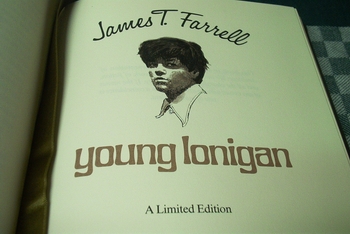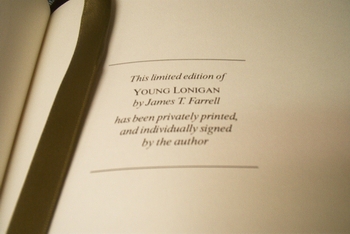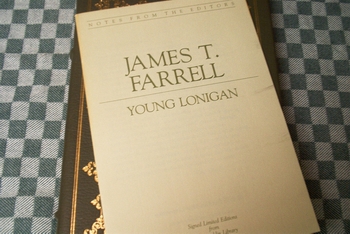Franklin Library James Farrell books
Young Lonigan - signed limited edition - 1979
Writer James Farrell biography
James Thomas Farrell, born on February 27, 1904, in Chicago, Illinois, was an American novelist and short story writer, best known for his Studs Lonigan trilogy. His works often delved into the struggles of working-class Irish-Americans in Chicago during the early 20th century. Farrell grew up in a predominantly Irish-Catholic neighborhood, experiencing firsthand the economic hardships and social challenges faced by the working-class families of Chicago. After attending the University of Chicago, Farrell began his writing career in the 1920s, contributing to various literary magazines.
His breakthrough came in the 1930s with the publication of the Studs Lonigan trilogy. The first book, Young Lonigan (1932), followed by The Young Manhood of Studs Lonigan (1934) and Judgment Day (1935), chronicles the life of Studs Lonigan from his youth to adulthood. The trilogy explores themes of identity, morality, and the impact of social and economic forces on individual lives. Farrell's realistic portrayal of urban life and his unflinching examination of societal issues garnered both acclaim and controversy. While the Studs Lonigan trilogy brought Farrell recognition, it also sparked criticism from some quarters due to its explicit content and social commentary. Despite the controversy, the trilogy remains a significant contribution to American literature.
Apart from Studs Lonigan, Farrell wrote numerous other novels, short stories, and essays. His body of work includes the Danny O'Neill series and the Bernard Carr trilogy. Farrell's writing often reflected his leftist political views, and he was involved in political activism throughout his life. In addition to his fiction, Farrell wrote essays and critiques on literature, politics, and society. He was an active participant in leftist circles and associated with various political movements. However, his political affiliations led to McCarthy-era scrutiny, and he found himself blacklisted during the Red Scare. James T. Farrell continued writing until his death on August 22, 1979. Despite the controversies and challenges he faced, Farrell's legacy endures through his exploration of social issues, his portrayal of the working class, and his impact on American literary realism.
Young Lonigan - Studs Lonigan trilogy book 1
An American classic in the vein of John Steinbeck's The Grapes of Wrath , the first book of James T. Farrell's powerful Studs Lonigan trilogy covers five months of the young hero's life in 1916, when he is sixteen years old. In this relentlessly naturalistic yet richly complex portrait, Studs is carried along by his swaggering and shortsighted companions, his narrow family, and his educational and religious background toward a fate that he resists yet cannot escape.
It's a story about coming-of-age and sexual awakening in the mean streets of 1910s Chicago. It's the beginning of a trilogy that will follow Studs Lonigan throughout adolescence. And, claims Arthur Schlesinger, Jr, it reveals "his vision of the truth-the truth about people, the truth about writing, the truth about America."
It's the summer of 1916 in the tough South Side of Chicago, and William "Studs" Lonigan - on the verge of fifteen and wearing his first long trousers - is ready to kick loose. He's leaving behind the jailhouse rigors of St. Patrick's school and embarking on the adventure of his life.
In James T. Farrell's classic novels of Irish life on the South Side of Chicago, Farrell portrays sympathetically and graphically his protagonist's coming of age.






Comments
Post a Comment
Share your best book review and recommendation